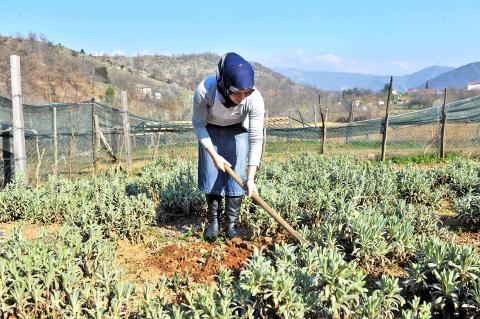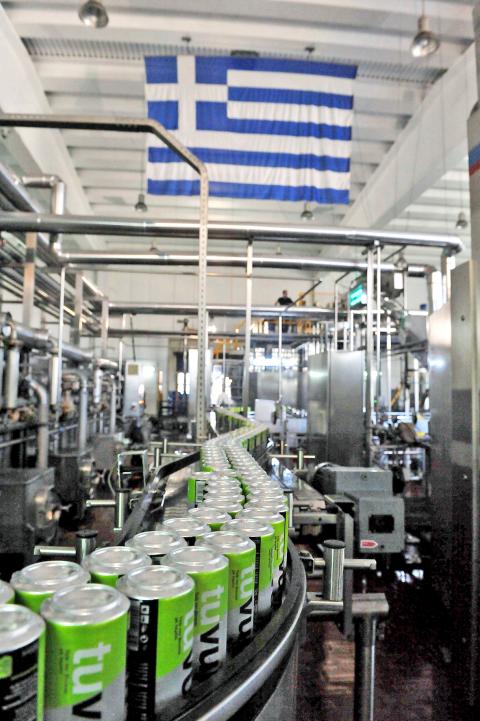Christos Mousafidis, a police officer on the Greek-Albanian border, mainly deals with drug trafficking and illegal immigration. However, this year, he is grappling with a different kind of crime: herb smuggling.
“Villagers alerted us to it,” he said. “Something was going on.”
Climbing for about an hour and a half up to an altitude of about 1,300m, “we discovered a camp in the middle of the mountains and more than a dozen Albanian pickers at work,” Mousafidis said.

Photo: AFP
The makeshift camp of nylon and plastic tents had several days’ worth of provisions.
Mules stood ready to transport the harvest — a staggering 4.5 tonnes of a type of sage —- to market along mountain paths to neighboring Albania.
In August, some less discreet pickers were arrested in the center of Tripoli, a city in the southern Peloponnese, with a truck load of 200kg of wild oregano and “mountain tea” — a very popular infusion in Greece.

Photo: AFP
Though pickers are well aware of the profits to be had from wild Greek plants, the boon has been largely overlooked by the legitimate agricultural sector.
“We have a remarkable biodiversity. Of 7,500 plant species [in Greece], 20 percent are aromatic and pharmaceutical herbs, including dozens of endemic species, but they are not grown very much,” said Eleni Maloupa, a researcher at the Greek agricultural organization DEMETRA.
Greek exports are well behind the European leaders in the sector — Germany, France, Bulgaria, Italy and Poland.
ILLEGAL PICKERS
However, the demand is there. Illegal pickers were paid 20 euro cents (US$0.24) a kilo for herbs harvested this year on the border with Albania, which were sold on for 4 euros a kilo by a middleman in Italy, Mousafidis said.
Whether the end use was culinary or pharmaceutical has not been determined, but the trade was brisk enough that another group was caught in the act at the same place a few weeks later.
The clandestine trade “hurts the flora because the cutting is done without precautions,” forestry official Soulatana Giannakoupolo said.
Maloupa, who runs a botanical garden in northern Greece that specializes in aromatic herbs, also lamented the uncontrolled sale of the herbs.
Kostas Economakis, an expert on mountain teas who formerly worked at the National Institute of Agronomics Research, said: “It’s so much lost profit because these herbs are sold for less when they are not certified.”
At the market in northern Salonika, half of the plants sold in sachets were not cultivated, but picked wild on the mountainside, Maloupa said.
However, the tide is turning. Last year Greek growers set up an association while the government launched a “national catalogue” serving as a scientific reference on the plants.
YOUNG OWNERS
“More and more young people or entrepreneurs are turning towards ... aromatic and pharmaceutical plants,” Maloupa said.
Since 2012, Greek mountain tea has been available in ready-to-drink form with the brand name “Tuvunu” and sold in San Francisco, New York and Paris.
Developed in northeastern Greece between Xanthi and Komotini, Tuvunu is “a mixture of 17 kinds of mountain tea, honey, lemon and nothing else,” owner Demetri Chriss said.
To ensure quality, the business persuaded farmers in the region to alternate the crop with the tobacco they grow.
“Now we have agreements with 300 farmers all over Greece. And we turn down proposals from those who want to send us wild herbs picked in the mountains,” he said.

MULTIFACETED: A task force has analyzed possible scenarios and created responses to assist domestic industries in dealing with US tariffs, the economics minister said The Executive Yuan is tomorrow to announce countermeasures to US President Donald Trump’s planned reciprocal tariffs, although the details of the plan would not be made public until Monday next week, Minister of Economic Affairs J.W. Kuo (郭智輝) said yesterday. The Cabinet established an economic and trade task force in November last year to deal with US trade and tariff related issues, Kuo told reporters outside the legislature in Taipei. The task force has been analyzing and evaluating all kinds of scenarios to identify suitable responses and determine how best to assist domestic industries in managing the effects of Trump’s tariffs, he

TIGHT-LIPPED: UMC said it had no merger plans at the moment, after Nikkei Asia reported that the firm and GlobalFoundries were considering restarting merger talks United Microelectronics Corp (UMC, 聯電), the world’s No. 4 contract chipmaker, yesterday launched a new US$5 billion 12-inch chip factory in Singapore as part of its latest effort to diversify its manufacturing footprint amid growing geopolitical risks. The new factory, adjacent to UMC’s existing Singapore fab in the Pasir Res Wafer Fab Park, is scheduled to enter volume production next year, utilizing mature 22-nanometer and 28-nanometer process technologies, UMC said in a statement. The company plans to invest US$5 billion during the first phase of the new fab, which would have an installed capacity of 30,000 12-inch wafers per month, it said. The

Taiwan’s official purchasing managers’ index (PMI) last month rose 0.2 percentage points to 54.2, in a second consecutive month of expansion, thanks to front-loading demand intended to avoid potential US tariff hikes, the Chung-Hua Institution for Economic Research (CIER, 中華經濟研究院) said yesterday. While short-term demand appeared robust, uncertainties rose due to US President Donald Trump’s unpredictable trade policy, CIER president Lien Hsien-ming (連賢明) told a news conference in Taipei. Taiwan’s economy this year would be characterized by high-level fluctuations and the volatility would be wilder than most expect, Lien said Demand for electronics, particularly semiconductors, continues to benefit from US technology giants’ effort

‘SWASTICAR’: Tesla CEO Elon Musk’s close association with Donald Trump has prompted opponents to brand him a ‘Nazi’ and resulted in a dramatic drop in sales Demonstrators descended on Tesla Inc dealerships across the US, and in Europe and Canada on Saturday to protest company chief Elon Musk, who has amassed extraordinary power as a top adviser to US President Donald Trump. Waving signs with messages such as “Musk is stealing our money” and “Reclaim our country,” the protests largely took place peacefully following fiery episodes of vandalism on Tesla vehicles, dealerships and other facilities in recent weeks that US officials have denounced as terrorism. Hundreds rallied on Saturday outside the Tesla dealership in Manhattan. Some blasted Musk, the world’s richest man, while others demanded the shuttering of his